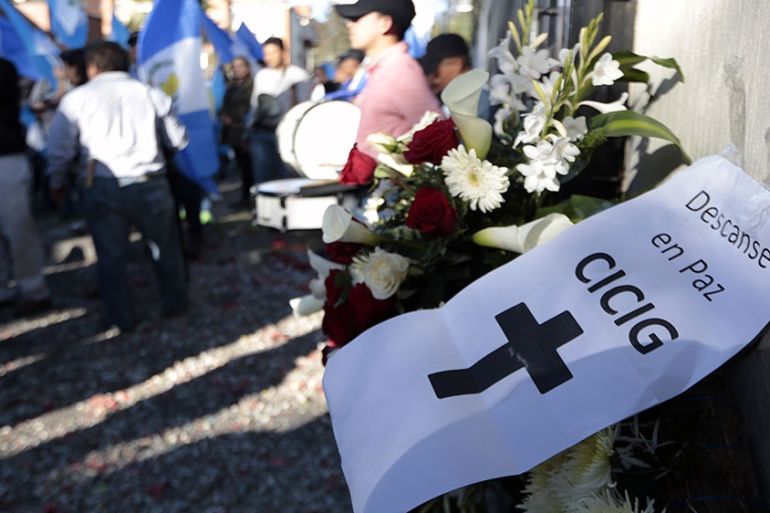Guatemala court blocks president’s expulsion of anti-graft body
Constitutional Court’s decision comes days after President Morales suspends UN-backed anti-corruption commission.

Guatemala City, Guatemala – The Guatemalan Constitutional Court has suspended the decision by President Jimmy Morales’s administration to end the mandate of a United Nations-backed anti-corruption commission.
The court convened overnight on Tuesday after members of civil society, lawyers and Indigenous Ancestral Authorities filed injunctions against the president’s decision to withdraw from the International Commission Against Impunity in Guatemala (CICIG).
Keep reading
list of 4 itemsRussia arrests deputy defence minister suspected of taking bribes
Ukraine’s agriculture minister suspected of corrupt land grab
Slapped: Speaking Up In Thailand
“The court has held up the law and returned the principles of international law that are held up in [the Guatemalan] constitution. It has served as a limit to the abuses of power of any organ of the state,” Oswaldo Samoya, a Guatemalan Constitutional lawyer, told Al Jazeera.
“It is evident that there is a desperation within the executive branch to brutally dismantle the investigations in anti-corruption efforts,” said Samayoa.
“The Constitutional Court has once again confronted these abuses.”
The Morales administration was informed of the court’s decision on Wednesday morning. It has yet to comment.
The court and Morales have been at loggerheads over CICIG, with the administration ignoring prior court decisions.
The Morales administration made the announcement that it was ending the agreement with the UN during a press conference on Monday in Guatemala City, where the president accused the anti-corruption body of polarising the country.
Morales claimed the CICIG jeopardises national security, violates human rights and is allied with criminal networks and “terrorists”.
The anti-corruption body was given 24 hours for their investigators to leave the country. By Tuesday afternoon, CICIG investigators had fled the country, citing concern for their security.
More than 100 people protested outside the Constitutional court in Guatemala City on Tuesday, showing their support for the anti-corruption efforts by the CICIG. Protests continued Wednesday, and more are expected next week.
‘Undermine future investigations’
“The government is forcing on the state a coup d’etat to dismantle the investigations of the CICIG that are in the process and to undermine future investigations at the time of the beginning of the electoral process,” Gabriel Wer, one of the founders of the anti-corruption group Justicia Ya, told Al Jazeera.
The Morales administration’s actions against the CICIG have received widespread condemnation from the International community, including from the embassies of the United States, Germany, England, France, the European Union, and Sweden.
“The United States is concerned about the future of anti-corruption efforts in Guatemala,” the US embassy said in a press statement. “The rule of law, the reduction of corruption and the end of impunity are key to security, stability and prosperity, not only in Guatemala, but throughout the region.”
The CICIG was formed in 2006 upon the request of the Guatemalan government to combat high rates of impunity for crimes.
The commission was ratified by the country’s legislative branch in 2007 following a massive police scandal.
The commission’s 2015 corruption investigation in the administration of Otto Perez Molina led to the resignation of the former president, who is currently facing criminal charges.
Troublesome case
Meanwhile, the country’s Supreme Court began hearings on the possibility of impeaching three members of the Constitutional Court.
The hearing was called after Attorney General of the Nation Jorge Donado, who was appointed by Morales in May 2018, filed an injunction against three magistrates of the Constitutional Court.
The case against the judges is problematic, according to Samayoa.
“This is not the function of the Attorney General of the Nation, but rather the function of the Public Prosecutor’s office,” explained Samayoa.
“If the Attorney General of the Nation had evidence of an illicit action, then they should have gone to the Public Prosecutor’s office for an investigation.”